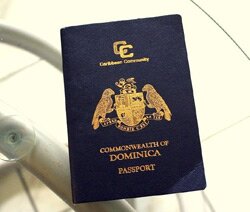Second Passports

Second passports have been the centre of debate for quite some time now, where it relates to obtaining second passports through economic citizenship and citizenship by investment programs.
Most of the concern surrounding programs for second passports emerged soon after 9/11 and major countries partially attributed their financial woes to international tax and asset management strategies undertaken by their citizens.
Second passport information shows that a second passport delivers many benefits and advantages. Even when acquired after having lived in the United States for several years or after a couple of months by applying to an economic citizenship program in Dominica or St. Kitts. A fact is that the very same threats presented by terrorists and which demand stringent due diligence are the same to which every second passport program is exposed. It is also sad but true that individuals who pose major threats to national security worldwide are often normal unsuspecting people, living normal lives, living and holding second passports of normal, peaceful countries.
The reasons for applying for a US passport or the passport of any country for that matter are often identical. People search for better life opportunities, new beginnings, investor friendly tax regimes that stimulate business, a second home to turn to in the event of natural disaster, war, economic turmoil, and more visa free travel opportunities.
Plus, no one has to look very far to choose a country for second citizenship (second passport). This goes on to explain why an Italian would perhaps move on to Britain or France, or a Mexican would move to Panama, or a Canadian would move to the United States and vice versa. There will be tax, social, political, educational, health, military protection, financial and personal benefits to look forward to in one way or the other.
Not all countries impose tax on income earned by their citizens overseas. But where governments do, tax on international income has been a consideration for getting a second passport or even renouncing citizenship all together. In some instances, tax on international income is described as ‘tax on citizenship’ as taxes are still imposed on people even if they live and are settled in another country. Meanwhile, withholding tax is levied on interests earned on bank accounts held in a country where the person is a permanent resident or national, such as under the EU Tax Savings Directive.
Economic citizenship programs such as for Dominica second passport and the St Kitts second passport do not impose residency requirements on applicants but are generally more financially demanding. Under the Dominica second passport program for example, an individual would have to make a contribution of US$75,000 and would have to cover the cost for due diligence. Due diligence is conducted prior to being accepted to apply for economic citizenship and transferring the relevant contribution to the Government’s escrow.
Likewise, for the St. Kitts second passport through citizenship by investment, an individual is required to make a contribution of US$250,000 if contributing to the Sugar Investment Diversification Fund. These figures increase with families, especially according to the number of persons there are.
St. Kitts and Dominica second passport applications are processed through local agents who are licensed to collaborate with the government and offer Dominica second citizenship as a service.
These two second citizenship programs offer many advantages. Dominica and St. Kitts are peaceful, known for untouched forests, white sand beaches and lovely tropical weather. Dominica second passport sure does serve as a gateway to home ownership on one of the most natural places still standing on Earth, and most importantly to social, economic and political stability and democratic freedom. Also, a Dominica and St. Kitts second passport can be used to travel to all member states of CARICOM visa free and to all other countries with which St. Kitts and Dominica passport holders enjoy visa free access.
